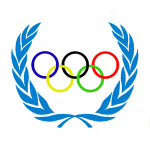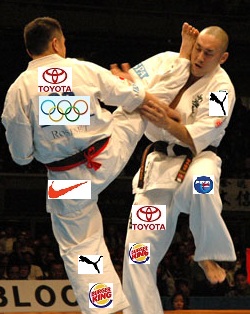From the Norwegian Martial Art Federation:
According to British bookmakers, karate is a clear favorite to be admitted to the Olympic program when the IOC meets Buenos Aires in September next year.
 Read –> Doc
Read –> Doc
Karate narrowly lost the battle to get on the Olympic program in 2016 to golf and rugby, but is now set with baseball, squash, roller skating sports, softball, climbing, wave boards, and wushu as a new sport from 2020. IOC has a list of 30 criteria which they consider sports. Some of the criteria is how popular the sport is, how it controls, and how effective anti-doping program.
Karate has everything it takes to become an Olympic sport. Karate has made the competition rules and has been an exciting TV sport of speed and excitement. Karate has over 50 million practitioners worldwide and is one of the biggest sports in the world.
If karate is accepted to the program from 2020 and Tokyo in Japan is awarded the Olympics for 2020 as karate’s homeland, we will experience a wonderful Olympics. Istanbul, Tokyo, Baku, Doha and Madrid are fighting to be the organizer of the Summer Olympics 2020.
Se norsk versjon her.
As you have realized this is the point karate, and not Full Contact Karate that many would wish in this article. But it still brings up many of the questions that will come up when it comes to full contact in the Olympics. There is a lot of hype at the moment in the direction of the Olympics and get approved Full Contact Karate as Olympic discipline. If / when point Karate and Wushu are Olympic disciplines as it seems, it should be (if possible) even more difficult to get Full Contact Karate approved. We must also remember that TKD and Judo has been established in the Olympics for a long time. Everyone knows that the “product” must sell well in the Olympics, and the consequence of this is frightening…
History of martial arts in the Olympics is that all disciplines have been hacked to pieces, to get in the direction of the commercial market that controls this total. And at this point, there is a very big challenge if you want Full Contact Karate in the Olympics. We must realize that for the large audience and to outsiders, is not 9 minutes with low kicks enough to increase the popularity. (To put it on the edge)
Judo took away the ground fighting, etc., TKD has changed the rules and equipment so many times that they no longer remember what the original was. Points karate has done the same to adapt. What are we willing to sacrifice in Full Contact karate to get into the “happy company”? Will there be any realistic possibility as the points karate (and Wushu) comes first? There are many questions and the answers will probably not right away.
But we also have something else: “Osu no Seishin”
Norsk versjon
Som dere har forstått så er dette poeng Karate, og ikke ikke Fullkontakt Karate som mange skulle ønske i denne artikkel. Men det bringer allikevel frem mange av de spørsmål som vil komme opp når det kommer til Full kontakt i OL. Det er stor hype for tiden i retning av OL og få godkjent Fullkontakt Karate som Olympisk gren. Hvis / når poeng Karate og Wushu blir Olympiske grener som det later til, skal det bli ( om mulig ) enda vanskeligere å få Full Kontakt Karate godkjent. Vi må også huske at TKD og Judo har vært etablerte i OL i lang tid. Alle vet også at i “produktet” må selge godt i OL , og konsekvensen av dette er skremmende.
Historikken for kampsport innenfor OL er at alle disipliner har blitt hakket i stykker, for å i møtekomme det kommersielle marked som styrer dette totalt. Og på dette punktet, får store utfordringer om man realistsk skal ha Full Kontakt Karate inn som disiplin i OL. Vi må innse at for det store publikummet og for utenforstående, kommer ikke 9 minutter med low kicks til å øke populæriteten. ( for å sette det på spissen )
Judo tok vekk bakkekamp med mer, TKD har forandret regler og ustyr så mange ganger at man ikke lenger husker hva orginalen var. Poeng-karaten har gjort det samme for å tilpasse seg. Hva er vi villig til å ofre innen Fullkontakt-karaten for å komme med i det “glade selskap” ? Vil det være noen realistisk mulighet ettersom poeng Karaten ( og Wushu ) kommer først? Spørsmålene er mange, og svarene kommer nok ikke med en gang.

Clean Gi har vært varemerket, noe som kan forandre seg fort i det olympiske settet.
Men vi har også noe annet: “Osu no Seishin”
Judo
Modern Olympic Judo is a point based sport, meaning you’re not supposed to watch it with a combat perspective. Also, Judo and Ju jitsu used to be the same thing. However, the sport of Judo branched off to make it a spectator sport. Because people found it boring to watch groundwork, they kept on modifying it to try to enforce contestants to show more exciting aspects of grappling, which are takedowns from the standing position. The judo you see on tv is a game, meant to be watched after you understand the rules and how you win and accrue points.
Watching high level Judo is for many boring if you aren’t familiar with the different levels of judo. The boring aspects are a result of both contestants possessing a high level of skills. Their Gi /uniform grabbing looks random and spastic. If you watch low level Judo, you don’t have any of that chaotic Gi grabbing because people haven’t mastered throws. In Olympic Judo, if you let your opponent get his grip of choice on you, he’ll throw you with a move he’s practiced a thousand of times every week since he/she was 7.
TKD
Taekwondo first became a medal sport at the 2000 Games in Sydney after having been a demonstration sport at the 1988 Games in Seoul and the 1992 Games in Barcelona. TKD have been changing their rules many times to please the Olympic.
Last change of Rules (2012)
Taekwondo officials are changing the rules to protect fighters from the impact of head kicks.
At the London Olympics, fighters will score points for head kicks as soon as any part of their foot touches their opponent’s head – without regard for impact, as was previously the case. World Taekwondo Federation sports director Jeongkang Seo says the change will make scoring more uniform and encourage athletes to try for more head kicks without demanding extreme force.
Note:
The change will likely have little effect on head kicks that most never result in knockouts. Normally the Olympic Tkd fighters uses technique that are almost always delivered with significant lack of power, based on speed with light touch combined.
